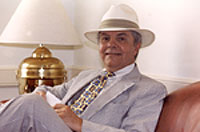In the spring of 1957 the Reserve Record published a series of limericks celebrating and poking fun at the faculty. Here's the one about a WRA history teacher who spent many years as the college guidance director:
A middle-aged man with ambitions
Searches yearly for college positions;
A veritable hound he
(His surname is Roundy)
Gains not one but fifty admissions.
A veritable hound he
(His surname is Roundy)
Gains not one but fifty admissions.
 Paul C. Roundy (1905-1976), a Vermont native, earned his B.A. at Amherst in 1926, then went to Oxford University where he received a certificate in theology. He taught math at Carlton College in Minnesota and at a college in South Dakota before coming to Ohio, where he joined the WRA faculty in 1932. By attending classes for several summers, he earned a master's in education at Harvard in 1937 and was elected to Phi Beta Kappa.
Paul C. Roundy (1905-1976), a Vermont native, earned his B.A. at Amherst in 1926, then went to Oxford University where he received a certificate in theology. He taught math at Carlton College in Minnesota and at a college in South Dakota before coming to Ohio, where he joined the WRA faculty in 1932. By attending classes for several summers, he earned a master's in education at Harvard in 1937 and was elected to Phi Beta Kappa.Roundy was director of studies and strongly influenced the WRA curriculum while teaching history and serving as chair of the guidance committee. For many years he coached soccer and several of his teams were league champions. He was known as a champion of high standards and as an original and effective teacher. His wife, Elinor Roundy, also was on the faculty as a member of the English department from 1949 until 1970, when both Roundys retired to their home in Vermont. At the time of his retirement, Paul Roundy was the subject of verses written in tribute to his career and influence.
Kind sir, how many years, how many boys
You gently guided now have gone their separate ways!
Our memory still counts you in its joys
And how, with stirring grace, you read Macaulay's Lays.
You taught us human dignity, that it survives
In times which seem so reckless, lacking plan;
By carrying the fire from noble lives
You gave us Homer's gift: a sense of man.
You gently guided now have gone their separate ways!
Our memory still counts you in its joys
And how, with stirring grace, you read Macaulay's Lays.
You taught us human dignity, that it survives
In times which seem so reckless, lacking plan;
By carrying the fire from noble lives
You gave us Homer's gift: a sense of man.
George Birnbaum '66
 Since 1982 WRA has had a Paul and Elinor Roundy Chair in History and Literature which is presently held by history department chair James Bunting. The Paul C. Roundy Scholarship Fund was established in 2000.
Since 1982 WRA has had a Paul and Elinor Roundy Chair in History and Literature which is presently held by history department chair James Bunting. The Paul C. Roundy Scholarship Fund was established in 2000.



